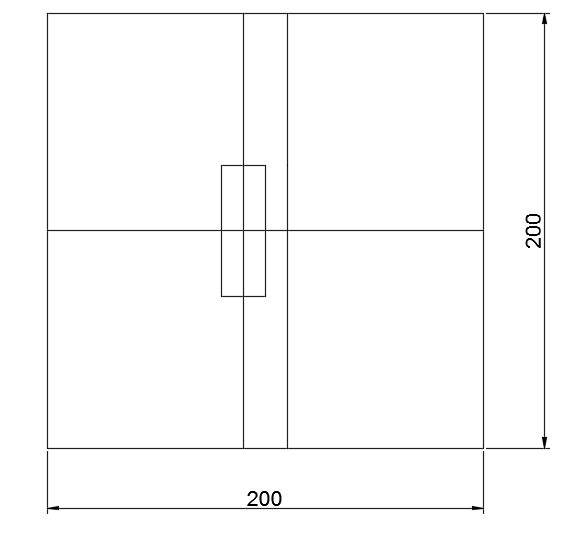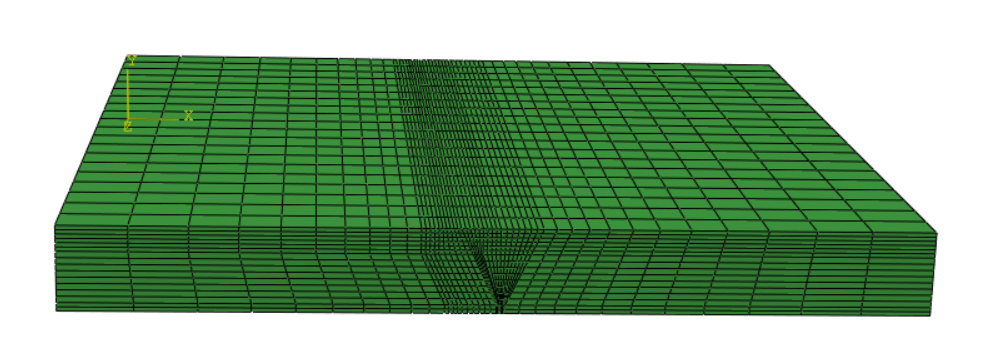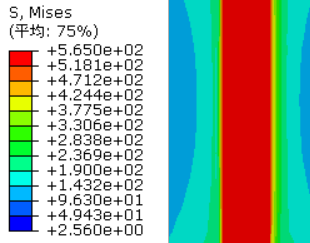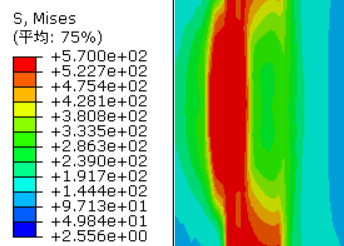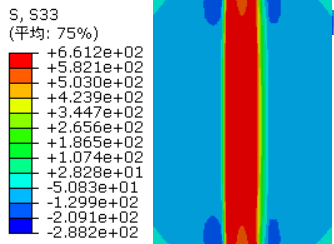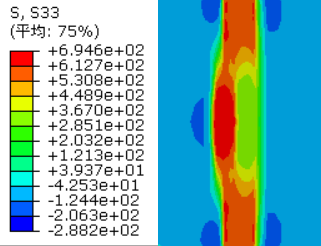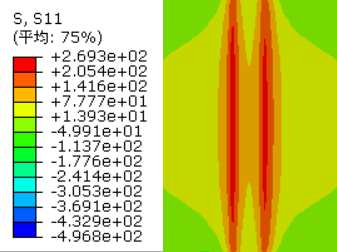承压设备用CF62高强钢焊接修补工艺优化毕业论文
2020-06-20 19:14:47
摘 要
压力容器是属于特种设备行列的,特别在化工领域的利用较多。高强钢制压力容器一般发挥保存危险介质的作用,使用时间过久就会发生因腐蚀而导致的外壁变薄和出现裂纹的问题。服役期间如果缺陷已经不能容忍,常用打磨的方式抹除它。但是,利用打磨的技术会导致外壁小块区域变薄,这就危害了压力容器的整体的强度设计,这时就需要焊接修补。
本文是国家十三五重点研发计划研究的一部分。本文主要探索线能量、焊接修补长宽深对CF62钢经焊接修补后残余应力分布规律变化的影响,使用的有限元数值模拟软件是ABAQUS。本文的主要探索内容及成果如下:
(1)用ABAQUAS探索CF62补焊前后残余应力的变化。研究可得,在补焊缝处,补焊后残余应力是增大的。
(2)采用控制变量法运用ABAQUS探索线能量的改变对焊后残余应力的分布规律的影响。研究可得,在补焊缝处,跟着线能量的提升S11呈上升趋势,但焊接修补热输入对Mises、S33有较小影响。
(3)采用三因素三水平正交试验的方法用ABAQUS软件探索不同焊接修补长度、宽度、深度对焊后残余应力的影响。研究可得,影响S11残余应力大小影响的主要顺序依次为“焊接修补宽度>焊接修补深度>焊接修补长度”。最终得出焊后残余应力较小的焊接修补工艺为:焊接修补长度 100mm、宽度 10mm、深度 4mm。
关键词:焊接修补 残余应力 正交试验
OPTIMIZATION OF WELDING REPAIR PROCESS FOR CF62 HIGH STRENGTH STEEL FOR PRESSURE EQUIPMENT
ABSTRACT
Pressure vessels belong to the ranks of special equipment, especially in the chemical industry. High strength steel pressure vessels usually play the role of preserving dangerous media, and the use of time will lead to thinning of the outer wall and cracks. If defects are not tolerated, we will erase them in a usually polished manner during service. However, if the use of sanding results in thinning of the outer walls and this question endangers the overall strength design of the pressure vessel, pressure vessels require welding repair.
This paper is a part of the national key research project in 13th Five-Year. In this paper, the effects of line energy, welding repair length, width and depth on the distribution of residual stress in CF62 steel after welding repair are investigated. The finite element numerical simulation software used is ABAQUS. The main contents and achievements of this paper are as follows:
(1) Using ABAQUAS to explore the change of residual stress before and after CF62 welding. The research results show that the residual stress after welding is increased at the weld seam.
(2) The change of residual stress after butt welding was investigated by using the control variable method and ABAQUS. The research results show that the S11 increases with the increase of line energy at the weld seam, but the welding repair heat input has a little influence on Mises and S33.
(3) Using the method of three factors and three levels orthogonal test, the influence of the length, width and depth of welding repair on residual stress after butt welding was investigated by ABAQUS software. The main order of influence on the residual stress of S11 is the width of weld repair, the depth of welding repair and the length of welding repair". Finally, it is concluded that the welding repair process after welding residual stress is smaller: welding repair length 100mm, width 10mm and depth 4mm.
Keywords: Repair welding; Residual stress; Orthogonal combination experiment
目录
摘要 Ⅰ
ABSTRACT Ⅱ
第一章 绪论 1
1.1 课题来源及研究的意义及背景 1
1.2 国内外在该方向的研究现状及发展趋势 2
1.3 焊接残余应力产生的原因及影响因素 3
1.3.1 焊接残余应力产生的原因 3
1.3.2 焊接残余应力的影响因素 3
1.4 课题研究内容及技术路线 4
第二章 CF62制压力容器焊接故障树分析方法 5
2.1故障树分析方法 5
2.2 CF62制压力容器故障树分析 6
第三章 CF62钢焊接接头焊接修补数值模拟 9
3.1 焊接接头补焊有限元模型的建立 9
3.1.1 焊接修补模拟建模方案 9
3.1.2 物理性能参数 10
3.1.3 单元划分 11
3.1.4 热源模型 12
3.1.5 初始条件和边界条件 12
3.1.6 焊接数值模拟原理 13
3.2 焊接修补后残余应力分布 13
3.3 本章小结 16
第四章 CF62钢不同热输入对残余应力的影响 17
4.1 不同热输入焊接修补残余应力研究 17
4.2 不同热输入焊接修补数值模拟 17
4.3 本章小结 20
第五章 CF62钢焊接补焊缝尺寸对残余应力的影响 21
5.1 焊接修补尺寸正交试验分析 21
5.1.1 焊接修补尺寸正交试验方案 21
5.1.2 焊接修补正交试验结果分析 21
5.2 本章小结 26
第六章 结论与展望 27
6.1 结论 27
6.2 展望 27
参考文献 28
第一章 绪论
1.1 课题来源及研究的意义及背景
本项目是国家十三五重点研发计划研究的一部分。高强钢制承压设备用于各种危险介质的储存,长期服役后可能出现腐蚀减薄或开裂现象。实际工作中如果经检测觉察了不能容忍的缺陷,需用打磨的手段将危害性缺陷扼杀在摇篮中。然而,打磨后,金属局部壁厚降低,可能影响承压结构本体强度,往往需要修补。对于高强钢修补一直是工程上的难题,如果处理不当,可能出现越补越裂。
进行3D顺序耦合有限元模拟以研究温度场和CF62制压力容器的修补焊缝中的残余应力。修复长度对残余的影响应力研究,旨在为修复CF62制成的压力容器提供参考。有研究得出,一般会有不小的残余应力在修补焊缝和它周边滋生,而在距离焊缝较远的领域残余应力较低。通过厚度的残余应力包覆层相对均匀,而它们在基底金属中是不均匀的,不连续应力在焊接金属和基底金属之间的界面上产生分布。最后研究得出,修理长度对横向残余应力的影响是负相关的,即前者越长,后者越小;反之亦然。
承压设备在修理期间产生残余应力并损坏结构完整性,可以运用有限元法(FEM)预测压力容器预测焊缝残余应力,修复宽度对残余应力的决定作用也通过数值模拟进行研究。有研究指出,随着修补宽度的提升,残余应力降低。
相关图片展示:
